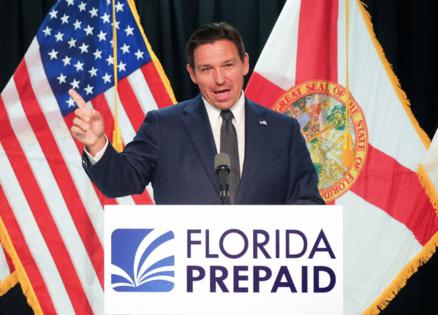DeSantis calls for special session to aid Trump's immigration crackdown
Published in News & Features
Gov. Ron DeSantis called Monday for a special legislative session to help implement President-elect Donald Trump’s immigration agenda, saying he anticipates the new administration will enact “ambitious policy changes” on day one and Florida needs to be ready to assist.
DeSantis, speaking at the Florida Capitol, said he wants to ensure local law enforcement officials who don’t cooperate with Trump’s immigration policies are held accountable, threatening them with suspension if they neglect their duties. The immigration crackdown will require new legislation and funding, he said.
Although DeSantis generally did not offer specifics, some law enforcement officials in Florida and around the country have expressed reluctance to assist in federal roundups of undocumented immigrants, or to hold people in jail solely because of their immigration status.
“We need to act, and we need to act quickly,” DeSantis said. “We don’t have time to waste. The American people spoke very clearly.”
Trump takes office on Jan. 20, and DeSantis wants lawmakers to convene in Tallahassee starting Jan. 27. The Florida Legislature is scheduled to start its regular session March 4.
During his presidential campaign, Trump called for the “mass deportation” of undocumented people in the United States, estimated at about 11 million. About 1.2 million undocumented immigrants live in Florida, the third largest undocumented population in the country, according to The Pew Research Center.
Trump hosted DeSantis and other GOP governors at his Mar-a-Lago estate in Palm Beach last week.
DeSantis’ vow to help push Trump’s agenda drew swift condemnation from immigration advocacy groups.
Using local officers to round up undocumented immigrants would undermine public safety, said Felipe Sousa-Lazaballet, who leads the Hope CommUnity Center in Apopka, which for decades has worked with immigrants in Orange County.
“We know for a fact that immigrants are afraid to report crimes, and because of that, become vulnerable to crimes,” he said. “Not only that, it makes it harder for law enforcement to do their job.”
State Rep. Anna Eskamani, D-Orlando, said immigrants are vital for Florida’s tourism, agriculture and construction industries.
“Targeting these communities isn’t just cruel — it’s bad for business,” she said.
DeSantis did not provide many specifics Monday on what immigration laws he wants the Legislature to enact.
But he endorsed rolling back in-state college tuition for undocumented students, saying the state needs to eliminate “incentives” that attract undocumented immigrants. State Sen. Randy Fine, a Brevard County Republican, has filed a bill that would end in-state tuition for “Dreamers,” young people brought into the country illegally when they were children.
DeSantis said he expects the Trump administration will expand the 287(g) program, which allows state and local law enforcement to perform some immigration enforcement duties. He said that program should be mandatory for Florida’s law enforcement agencies.
“We have a responsibility to be in this fight,” DeSantis said. “State and local officials in Florida must help the Trump administration enforce our nation’s immigration laws.”
But sheriffs in Miami-Dade, Broward and Palm Beach counties have said they won’t participate in roundups of people living in the country illegally, though they would cooperate with federal authorities in turning over those who are accused of a crime and have an immigration detainer. Miami-Dade Sheriff Rosie Cordero-Stutz, who was endorsed by Trump, told CBS News Miami her office would not assist with carrying out mass deportations.
“Immigration will impact our community, but we’re going to make sure that we continue a good public service,” she said before DeSantis’ press conference Monday.
Cordero-Stutz later clarified her office’s position, saying anyone arrested with an immigration detainer will be turned over to the “appropriate agency” and her office will work with state and federal partners.
Central Florida law enforcement agencies, asked last month whether they would assist in a mass deportation effort, offered a variety of answers.
The Orange County Sheriff’s Office stressed in a statement that public safety depends on the “cooperation of victims, whether they have legal status or not” to arrest dangerous criminals. “It is imperative to the safety of the entire community that people can come forward as victims of or witnesses to crime, regardless of immigration status,” it said.
Asked to clarify if that meant the agency would not cooperate if asked by the federal government or state to identify and round up undocumented immigrants, the press office said it couldn’t “respond to hypothetical questions.”
The Orlando Police Department said it would not comment before specific legislation is filed in Tallahassee, and the Osceola County Sheriff’s Office did not respond to emailed questions.
Both the Seminole and Lake county sheriff’s offices said they would continue their policies of cooperating with state and federal law enforcement.
“Suffice it to say that we certainly won’t be taking a step back or decreasing our efforts in any way at that point,” said Lake spokesman John Herrell.
But Herrell noted the sheriff’s office does not “participate or assist in ‘roundups’,” only executing warrants for immigration violations on those already in jail on other charges.
DeSantis has made illegal immigration a top issue since he took office.
During his first year as governor, DeSantis enacted a ban on so-called “sanctuary cities” that offer protections to undocumented residents.
His administration flew migrants from Texas to Martha’s Vineyard in 2022, a move that generated a national political firestorm. Democrats slammed the flights as a publicity stunt, while supporters said they highlighted the need for action on the immigration issue.
The special session will also focus on hurricane aid, relief for condominium owners and the process for amending the state constitution through citizen-initiated petitions, DeSantis said.
DeSantis was highly critical of last year’s ballot initiatives that sought to protect abortion rights and legalize recreational marijuana.
Both earned a majority of the vote but fell short of the 60% supermajority threshold they needed to pass.
_____
©2025 Orlando Sentinel. Visit orlandosentinel.com. Distributed by Tribune Content Agency, LLC.







Comments